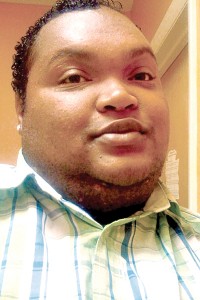Local
D.C. man found guilty in gay murder
Defendant accused of using chat line to lure ‘faggy’ for robbery

A D.C. Superior Court jury Tuesday found a District man guilty of first-degree murder while armed in the December 2009 shooting death of gay D.C. resident Anthony Perkins, whom police say met his killer through a gay telephone chat line.
The jury returned its verdict after deliberating for a little more than five hours following a five-day trial in which prosecutors said Antwan Holcomb, 21, shot Perkins in the head in Perkins’ car after luring him to a secluded street in Southeast Washington.
A witness who knew Holcomb testified that he overheard Holcomb say on the night of the murder that he “shot the ‘faggy’ in the head and robbed him of a pack of Newport cigarettes” before leaving Perkins’ Lincoln Town Car and fleeing the scene on foot.
“The price that the defendant put on the head of Mr. Perkins was a pack of cigarettes,” Assistant United States Attorney Steven Swaney, one of two prosecutors in the case, told the jury on Tuesday.
Chief Judge Lee Satterfield, who presided over the trial, scheduled Holcomb’s sentencing for May 5.
Perkins, 29, lived with his mother, Stella Perkins, who testified at the trial that her son’s murder was a devastating loss. He worked as a dispatcher for an air conditioning and heating company and enjoyed meeting people on phone chat lines, witnesses said during the trial.
Swaney and Assistant U.S. Attorney Michael Liebman presented law enforcement witnesses who pointed to phone records showing that Holcomb made repeated calls to a phone chat line called D.C. Raven. The chat line has separate lines for a variety of groups and interests, including a section with “gay chat numbers.”
Government witnesses testified that Holcomb met Perkins on the chat line on the night of Dec. 26, 2009 and engaged him in several conversations. The two exchanged their own phone numbers, the prosecutors said. Authorities later tracked the calls Holcomb made to Perkins on the night of the murder from a landline in a residence at 500 Lebaum St., S.E., where he had been staying.
“He stated that he posed as a homosexual in an attempt to lure a victim to his location for the purpose of robbing him,” according to a police affidavit used for Holcomb’s arrest in March 2010.
At the trial, prosecutors showed the jury a video of Holcomb being questioned by homicide detectives. Holcomb admitted to detectives that he talked to Perkins through the chat line and persuaded him to meet him on the night of the murder. But he denied he killed Perkins. Holcomb told the detectives in the taped interrogation that it was someone else who looked like him that entered Perkins’ car and shot Perkins. Police said Holcomb refused to identify that person.
The two prosecutors argued during the trial Holcomb fabricated that claim to get off the hook in the murder.
In the video recording of the interrogation session presented to the jury, one of the detectives joked with Holcomb about his decision to call a gay-oriented chat line. At one point, Holcomb said men using the chat line have money and likely would not report being robbed from someone they met through such a venue.
“I’m not of that nature … I’m a cold-blooded man,” he told the detectives. “I don’t like fags. I never will.”
At the time of Holcomb’s arraignment following his arrest in March 2010, Liebman told the Blade the U.S. Attorney’s office might consider asking a grand jury to classify the case as a hate crime. A subsequent grand jury indictment against Holcomb did not classify the case as a hate crime.
At the time the jury rendered its verdict Tuesday, a spokesperson for the U.S. Attorney’s office said Liebman and Swaney would not be immediately available to discuss the case.
Defense attorney Ronald Horton argued that there were no eye witnesses to the murder. He said one of the government’s lead witnesses, who said she saw Holcomb near the scene of the murder, was drunk at the time.
Horton said another key witness, a woman who once dated Horton, was biased against him because she caught him in bed with another woman. She should not be taken at her word for testifying that Holcomb entered her bedroom and placed a gun under the bed shortly after the murder took place, he told the jury.
He noted that Holcomb’s finger prints and DNA were not found inside Perkins’ car, supporting Holcomb’s claim that it was someone else that entered Perkins’ Lincoln Town Car and shot him point blank in the head.
Saying the jury was obligated under the law not to find Holcomb guilty unless the government proves its case beyond a reasonable doubt, told the jury, “This case is full of reasonable doubt.”
In his rebuttal arguments, co-prosecutor Swaney recited a litany of evidence he said provided proof beyond a doubt that Holcomb committed the murder.
Among other things, he pointed to Holcomb’s arrest for an unrelated incident on Dec. 12, in which he was charged with shooting two men outside the Player’s Lounge, a popular Southeast D.C. nightclub that has hosted events organized by gay activists.
Swaney pointed to police and firearm experts’ testimony that the bullet removed from Perkins’ head had been fired from the same gun that Holcomb allegedly used to shoot the two men outside the Player’s Lounge, one of whom is paralyzed from the waist down as a result of the gunshot wound.
Several letters that Holcomb wrote to a female friend while in jail following his arrest asked the friend to arrange for others to tell police that they saw someone other than Holcomb enter Perkins’ car on the night of the murder, Swaney noted to the jury. He called this a clear attempt by Holcomb to get people to help him conceal his involvement in a murder.
In addition to the first-degree murder charge, the jury found Holcomb guilty of armed robbery, unlawful possession of a firearm, and carrying a pistol without a license.
The D.C. group Gays and Lesbians Opposing Violence has raised concern over reports of gay men being targeted by criminals on telephone and Internet chat lines.
A widely reported case came four months after Perkins’ murder, when Montgomery County police disclosed that gay D.C. middle school principal Brian Betts, who was found murdered in his Silver Spring, Md., home last April, met one or more of the four teenage males charged in the case through an Internet sex chat line.
Maryland
Md. Commission on LGBTQIA+ Affairs released updated student recommendations
LGBTQ students report higher rates of bullying, suicide

The Maryland Commission on LGBTQIA+ Affairs has released updated recommendations on how the state’s schools can support LGBTQ students.
The updated 16-page document outlines eight “actionable recommendations” for Maryland schools, supplemented with data and links to additional resources. The recommendations are:
- Developing and passing a uniform statewide and comprehensive policy aimed at protecting “transgender, nonbinary, and gender expansive students” against discrimination. The recommendation lists minimum requirements for the policy to address: name, pronoun usage, and restroom access.
- Requiring all educators to receive training about the specific needs of LGBTQ students, by trained facilitators. The training’s “core competencies” include instruction on terminology, data, and support for students.
- Implementing LGBTQ-inclusive curricula and preventing book bans. The report highlights a “comprehensive sexual education curriculum” as specifically important in the overall education curriculum. It also states the curriculum will “provide all students with life-saving information about how to protect themselves and others in sexual and romantic situations.”
- Establishing Gender Sexuality Alliances “at all schools and in all grade levels.” This recommendation includes measures on how to adequately establish effective GSAs, such as campaign advertising, and official state resources that outline how to establish and maintain a GSA.
- Providing resources to students’ family members and supporters. This recommendation proposes partnering with local education agencies to provide “culturally responsive, LGBTQIA+ affirming family engagement initiatives.”
- Collecting statewide data on LGBTQ youth. The data on Maryland’s LGBTQ youth population is sparse and non-exhaustive, and this recommendation seeks to collect information to inform policy and programming across the state for LGBTQ youth.
- Hiring a full-time team at the Maryland Department of Education that focuses on LGBTQ student achievement. These employees would have specific duties that include “advising on local and state, and federal policy” as well as developing the LGBTQ curriculum, and organizing the data and family resources.
- Promoting and ensuring awareness of the 2024 guidelines to support LGBTQ students.
The commission has 21 members, with elections every year, and open volunteer positions. It was created in 2021 and amended in 2023 to add more members.
The Governor’s Office of Communication says the commission’s goal is “to serve LGBTQIA+ Marylanders by galvanizing community voices, researching and addressing challenges, and advocating for policies to advance equity and inclusion.”
The commission is tasked with coming up with yearly recommendations. This year’s aim “to ensure that every child can learn in a safe, inclusive, and supportive environment.”
The Human Rights Campaign’s most recent report on LGBTQ youth revealed that 46.1 percent of LGBTQ youth felt unsafe in some school settings. Those numbers are higher for transgender students, with 54.9 percent of them saying they feel unsafe in school.
Maryland’s High School Youth Risk Behavior Survey reveals a disparity in mental health issues and concerns among students who identify as LGBTQ, compared to those who are heterosexual. LGBTQ students report higher rates of bullying, feelings of hopelessness, and suicidal thoughts. Nearly 36 percent of LGBTQ students report they have a suicide plan, and 26.7 percent of respondents say they have attempted to die by suicide.
The commission’s recommendations seek to combat the mental health crisis among the state’s LGBTQ students. They are also a call for local and state governments to work towards implementing them.
Virginia
Va. lawmakers consider partial restoration of Ryan White funds
State Department of Health in 2025 cut $20 million from Part B program

The Virginia General Assembly is considering the partial restoration of HIV funding that the state’s Department of Health cut last year.
The Department of Health in 2025 cut $20 million — or 67 percent of total funding — from the Ryan White Part B program.
The funding cuts started with the Trump-Vance administration passing budget cuts to federal HIV screening and protection programs. Rebate issues between the Virginia Department of Health and the company that provides HIV medications began.
Advocates say the funding cuts have disproportionately impacted lower-income people.
The Ryan White HIV/AIDS Program, a federal program started in 1990, provides medical services, public education, and essential services. Part B offers 21 services, seven of which remained funded after the budget cuts.
Equality Virginia notes “in 2025, a 67 percent reduction severely destabilized HIV services across the commonwealth.”
Virginia lawmakers have approved two bills — House Bill 30 and Senate Bill 30 — that would partially restore the funding. The Ryan White cuts remain a concern among community members.
Both chambers of the General Assembly must review their proposed changes before lawmakers can adopt the bills.
“While these amendments aren’t a full restoration of what community-based organizations lost, this marks a critical step toward stabilizing care for thousands of Virginians living with HIV,” said Equality Virginia Executive Director Narissa Rahaman. “Equality Virginia plans to continue their contact with lawmakers and delegates through the conference and up until the passing of the budget.”
“We appreciate lawmakers from both sides of the aisle who recognized the urgency of this moment and will work to ensure funding remains in the final version signed by the governor,” added Rahaman.
District of Columbia
D.C. Black Pride theme, performers announced at ‘Speakeasy’
Durand Bernarr to headline 2026 programming

The Center for Black Equity held its 2026 DC Black Pride Theme Reveal event at Union Stage on Monday. The evening, a “Speakeasy Happy Hour,” was hosted by Anthony Oakes and featured performances by Lolita Leopard and Keith Angelo. The Center for Black Equity organizes DC Black Pride.
Kenya Hutton, Center for Black Equity president and CEO, spoke following the performances by Leopard and Angelo. Hutton announced this year’s theme for DC Black Pride: “New Black Renaissance.”
Performers for 2026 DC Black Pride were announced to be Bang Garcon, Be Steadwell, Jay Columbus, Bennu Byrd, Rue Pratt and Akeem Woods.
Singer-songwriter Durand Bernarr was announced as the headliner for the 2026 festivities. Bernerr gave brief remarks through a video played on the screen at the stage.
DC Black Pride is scheduled for May 22-25. For more information on DC Black Pride, visit dcblackpride.org.


















